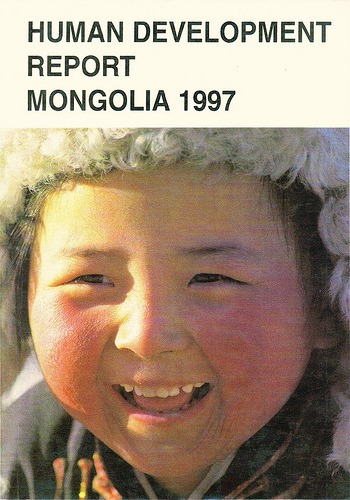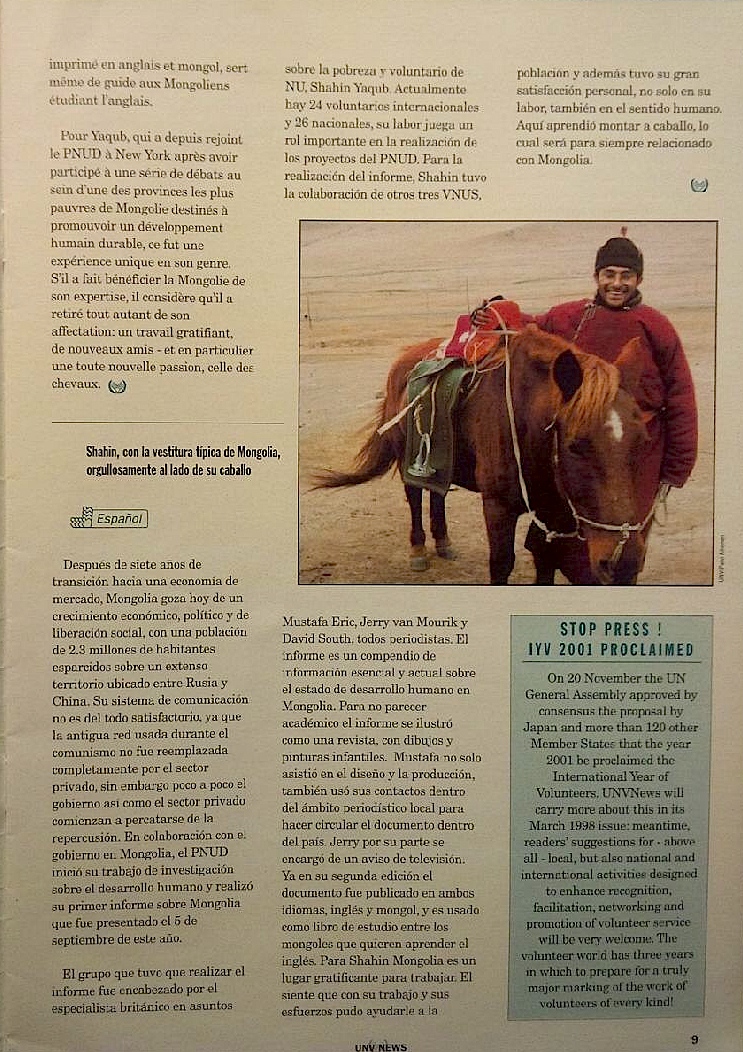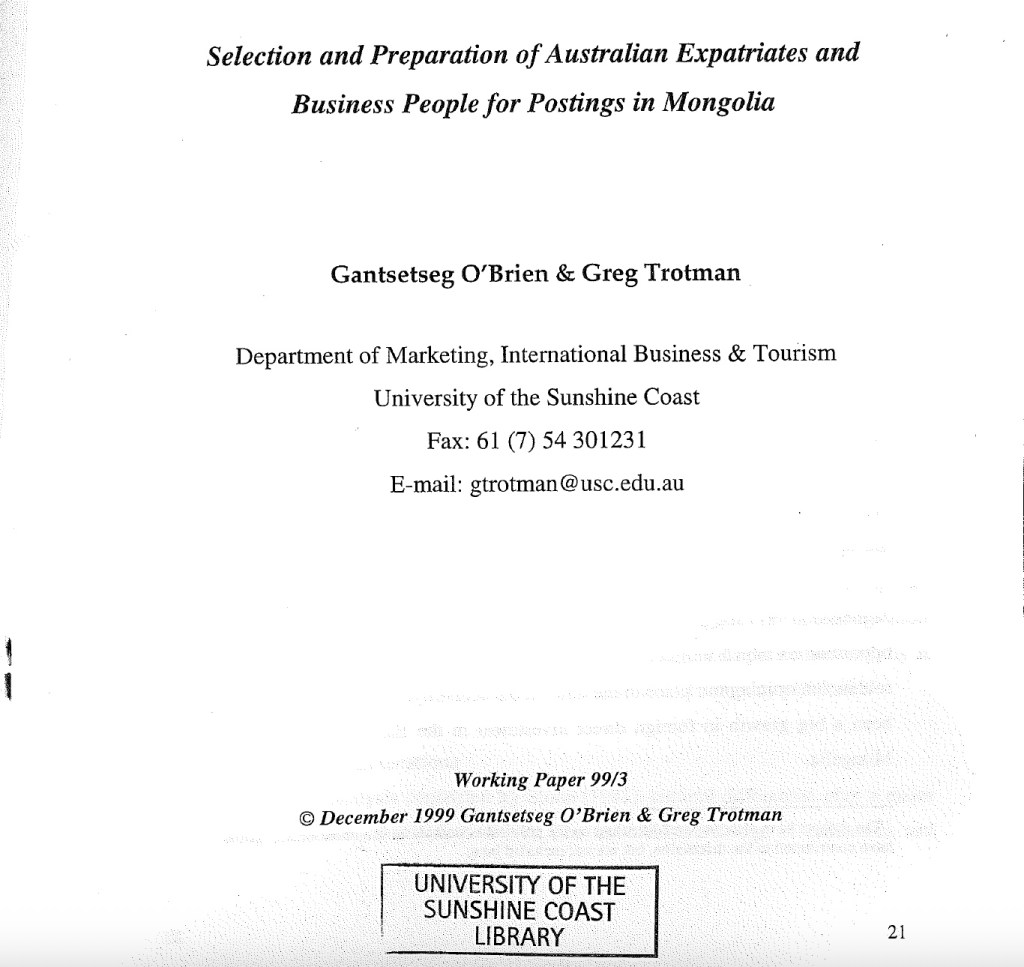By David South (Canada), UNV Information Officer, UNDP, Mongolia
UNV News #78 November 97
After seven years of transition to a market economy, Mongolia – a former satellite of the Soviet Union that has had a democratic government since 1992 – has been profoundly changed. Where it once had a rigid communist government and few contacts with the west, Mongolia has pursued rapid economic, political and social liberalisation. Mongolia has a small population – 2.3 million – spread out over a vast territory wedged between Russia and China.
Communication has in many ways deteriorated over the past seven years as the old communication networks from the communist era have not been fully replaced by the private sector. More and more it became apparent that government and the private sector were almost working in the dark in understanding how transition has affected Mongolians.
In partnership with the Mongolian government, UNDP initiated the researching of Mongolia’s first human development report back in the middle of 1996. It was launched on September 5 of this year, with UNVs playing a key role. To lead the team in producing the report, British poverty specialist and UNV Shahin Yaqub was brought in. Only 29-years-old – one of the youngest UNVs in Mongolia – Yaqub joined a rapidly expanding UNV presence in the country. There are now 24 international UNVs and 26 Mongolian UNVs deployed throughout the country in UNDP’s projects.
The thirst for expertise in Mongolia – a country undergoing the growing pains of transition to a market economy – has placed high demand on UNVs. UNVs occupy senior roles in all of UNDP’s projects.
The 1997 Mongolian Human Development Report is a prime example of the important goal of capacity building conducted by the UNDP. For Yaqub, the report’s principal author, it was like starting from scratch. A poverty research office had to be set up before the work could begin. A team of Mongolia’s top statistical researchers had to be trained in the latest methodologies for social research.
Yaqub was excited by the project. He said: ”There was no office when I first came. We had to organise the office to understand who does what and basically create the focal point for poverty analysis in Mongolia”.
Yaqub also had some of his basic assumptions tested. The small population of this country – only 2.3 million – had meant the previous communist regime was able to build up a large archive of statistics on the population. A good portion of the information was not up to international standards, but it potentially represented a wellspring of data to start from. “Mongolia is number-rich. To even have that kind of data is very rare for a developing country. But unfortunately we found all this information was stored on Russian mainframe computers that didn’t work anymore!”
During the actual production of the report, Yaqub was joined by three more UNVs: Mustafa Eric, a Turkish journalist working with the Press Institute of Mongolia, Jerry van Mourik, a Dutch journalist now working as the Support Officer to the United Nations Resident Co-ordinator, and UNDP Information Officer David South, a former journalist with the Financial Times in London, England.
The high-profile role played by media UNVs was crucial if the report was to not end up collecting dust on a government shelf. The report is a repository of essential and new information on the state of human development in Mongolia, including data showing rising poverty rates and serious threats to food security. Like all human development reports produced by UNDP, it was not meant to be a prescriptive tract, but a lubricant for a national debate on sustainable development in Mongolia. This altered the design and presentation of the report.
Instead of looking academic, the report took on the appearance of a magazine, from its cover to colourful children’s paintings inside. UNV Mustafa not only assisted with the report’s design and production, he also used his contacts in the Mongolian media to ensure the report was distributed across the country. UNV van Mourik assisted with publicity, including producing an emotionally-charged television commercial weaving together vignettes from Mongolia’s recent history to tell the story of human development.
Already in its second print run in both English and Mongolian, the report has been adopted as their study guide by Mongolians wanting to learn English.
“Mongolia is a rewarding place to work,” said Yaqub. “As a technical specialist and UNV, what you bring to the job is valued. I researched poverty for five years before coming to Mongolia and I felt I had something to contribute. But I also realised I had something to learn as well. You always have to keep in mind you are bringing your own baggage to the job – be it cultural, emotional or intellectual. Coming from an academic background, I was not afraid to be told I was wrong.”
Yaqub, who had worked in poverty analysis in the Philippines and Bangladesh before coming to Mongolia, will never forget the country that sparked his new passion: horses.
“You give up things as a volunteer – your time, your income, all the things you took for granted back home. But what you give up is compensated by rewarding work and good friends. When I learned to ride a horse, I can place it directly and clearly to Mongolia – that memory will always be with me.”
Just before Yaqub left Mongolia for work with UNDP in New York, he participated in a series of public debates in one of Mongolia’s poorest provinces, Khuvsgul aimag. The public debates are used to introduce the report to the grassroots while sparking discussion on sustainable human development.
Starting from scratch – The challenge of transition
Résumé en Français
UNV News #78 November 97
Sept années de transition vers une économie de marché et une libéralisation rapide tant économique et politique que sociale, ont profondément transformé la Mongolie, vaste territoire à faible densité de population bordé par la Russie et la Chine. Les communi-cations se sont fortement détériorées et ni le gouvernement ni le secteur privé ne se trouvaient manifestement en mesure d’évaluer l’impact de la transition sur la population. En collaboration avec le gouvernement, le PNUD a donc procédé à l’établissement du premier rapport sur le développement humain en Mongolie, publié en septembre de cette année.
Plusieurs VNU parmi le nombre croissant de volontaires actuellement en poste en Mongolie au sein de projets du PNUD – 24 internationaux et 26 nationaux – y ont pris une part prépondérante, tout particulièrement Shahin Yaqub, spécialiste britannique en recherche sur la pauvreté. Pour Yaqub, puis pour ses trois collègues VNU Mustafa Erik, Jerry van Mourik et David South, le défi consistait à partir de rien – pas de bureau, une base de statistiques existante… mais sur des ordinateurs russes hors service – pour mettre sur pied un rapport riche en informations qui, une fois terminé, n’irait pas dormir sur l’étagère d’un bureau gouvernemental mais servirait de base à une action durable à l’échelon national. Grâce au format adopté – un magazine abondamment illustré – , à sa présentation par les médias – notamment la télévision – et à sa diffusion à travers le pays entier, c’est chose faite. Le rapport, imprimé en anglais et mongol, sert même de guide aux Mongoliens étudiant l’anglais.
Pour Yaqub, qui a depuis rejoint le PNUD à New York après avoir participé à une série de débats au sein d’une des provinces les plus pauvres de Mongolie destinés à promouvoir un développement humain durable, ce fut une expérience unique en son genre.
S’il a fait bénéficier la Mongolie de son expertise, il considère qu’il a retiré tout autant de son affectation: un travail gratifiant, de nouveaux amis – et en particulier une toute nouvelle passion, celle des chevaux.
Starting from scratch – The challenge of transition
Resumen en Español
UNV News #78 November 97
Después de siete años de transición hacia una economía de mercado, Mongolia goza hoy de un crecimiento económico, político y de liberación social, con una población de 2.3 millones de habitantes esparcidos sobre un extenso territorio ubicado entre Rusia y China. Su sistema de comunicación no es del todo satisfactorio, ya que la antigua red usada durante el comunismo no fue reemplazada completamente por el sector privado, sin embargo poco a poco el gobierno así como el sector privado comienzan a percatarse de la repercusión. En colaboración con el gobierno en Mongolia, el PNUD inició su trabajo de investigación sobre el desarrollo humano y realizó su primer informe sobre Mongolia que fue presentado el 5 de septiembre de este año.
El grupo que tuvo que realizar el informe fue encabezado por el especialista británico en asuntos sobre la pobreza y voluntario de NU, Shahin Yaqub. Actualmente hay 24 voluntarios internacionales y 26 nacionales, su labor juega un rol importante en la realización de los proyectos del PNUD. Para la realización del informe, Shahin tuvo la colaboración de otros tres VNUS, Mustafa Eric, Jerry van Mourik y David South, todos periodistas. El informe es un compendio de información esencial y actual sobre el estado de desarrollo humano en Mongolia. Para no parecer académico el informe se ilustró como una revista, con dibujos y pinturas infantiles. Mustafa no solo asistió en el diseño y la producción, también usó sus contactos dentro del ámbito periodístico local para hacer circular el documento dentro del país. Jerry por su parte se encargó de un aviso de televisión. Ya en su segunda edición el documento fue publicado en ambos idiomas, inglés y mongol, y es usado como libro de estudio entre los mongoles que quieren aprender el inglés. Para Shahin Mongolia es un lugar gratificante para trabajar. El siente que con su trabajo y sus esfuerzos pudo ayudarle a la población y además tuvo su gran satisfacción personal, no solo en su labor, también en el sentido humano. Aquí aprendió montar a caballo, lo cual será para siempre relacionado con Mongolia.



https://davidsouthconsulting.org/2020/12/19/case-study-4-un-undp-mongolia-1997-1999/

Citation


This work is licensed under a Creative Commons Attribution 4.0 International License.
ORCID iD: https://orcid.org/0000-0001-5311-1052.
© David South Consulting 2025




Leave a comment